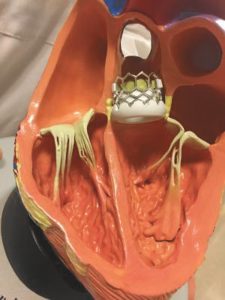 Interventional Cardiologist, Dr. Tracey Roth, has joined the Naples Cardiac & Endovascular Center (NCEC). Dr. Roth has been pivotal in advancing cardiology procedures in Southwest Florida. In 2017, he helped develop a Structural Heart Program that introduced the TAVR (Transcatheter Aortic Valve Replacement) for aortic stenosis.
Interventional Cardiologist, Dr. Tracey Roth, has joined the Naples Cardiac & Endovascular Center (NCEC). Dr. Roth has been pivotal in advancing cardiology procedures in Southwest Florida. In 2017, he helped develop a Structural Heart Program that introduced the TAVR (Transcatheter Aortic Valve Replacement) for aortic stenosis.
Aortic Stenosis
Stenosis means narrowing. Aortic stenosis is the narrowing of the aortic valve opening that results in restriction of blood flow to and from the heart. Although aortic stenosis can be congenital – called, “bicuspid aortic valve defect” – it more commonly develops during aging as calcium deposits in the valve.
Aortic stenosis (AS) is one of the most common but deadliest valve diseases affecting millions in the United States alone, according to Dr. Roth. It’s especially common in people 65 and older and affects 1 in 8 people over age 75. Left untreated, people with severe symptomatic AS have survival rates as low as 50 percent at two years and 20% at 5 years post diagnosis. There’s no one cause of heart valve disease, but it’s important to know what can put you at risk: Family history of heart disease, high blood pressure, high cholesterol, diabetes, and chronic kidney disease.
Symptoms: Calcium collection and stenosis can start as early as age 60; however, symptoms may not present at all or for many years, making diagnosis delayed. Furthermore, symptoms of AE can be subtle and often mistaken as other illnesses or mere aging. It’s important to recognize these symptoms in yourself or a loved one: feeling excessively tired – even after plenty of sleep; lightheaded or dizziness spells; shortness of breath after light activity or even when resting; rapid or fluttering heartbeat or chest pain; and swelling in your ankles or feet.
Early Treatment: There’s no way to prevent AS, so early diagnosis is key to preventing heart failure. Regular checkups with your Primary Care Provider can help to identify a heart murmur – a possible indicator of an aortic valve condition. Once diagnosed, you may be referred to a Cardiologist Clinic, like the Naples Cardiac & Endovascular Center, for continued monitoring and treatment.
Valve Replacement using Transcatheter Aortic Valve Replacement (TAVR): TAVR is a less invasive procedure for replacing a diseased aortic valve. In TAVR, a catheter is placed either through a tiny incision in the femoral artery (transfemoral) or through a small incision in the chest (trans-apical). The catheter guides a new prosthetic valve, which is inserted within the old valve and pushes away the diseased, damaged tissues, creating a robust wall for the blood to pass through.
TAVR is a critical alternative to open-heart surgery or a “sternotomy”, in which the chest is surgically separated (opened) for the procedure. The TAVR procedures can be done through very small openings that leave all chest bones in tact.
Given that TAVR is minimally invasive, patients should not experience the otherwise painful side affects from open-heart surgery, and healing time is considerably shortened. Patients will also be able to breathe better, have more energy, and begin to live a higher quality of life much sooner than those that undergo open-heart surgery.
Don’t wait for your aortic stenosis to worsen. Contact the Naples Cardiac & Endovascular Center (NCEC)to lean more about transcatheter aortic valve replacement (TAVR).
Dr. Tracey Roth at Naples Cardiac & Endovascular Center (NCEC):
Dr. Roth has more than 33 years experience in medicine. He graduated from Technion Israel Institute of Technology Medical School. Dr. Roth completed his interventional cardiology fellowship at NYC’s Mount Sinai Medical Center. He is board certified in cardiovascular disease and in interventional cardiology. He is a fellow of the American College of Cardiology. Dr. Roth developed the Structural Heart Program at Naples Community Hospital, which involved writing TAVR Protocols and Developing the TAVR Program. Over the past two decades he has been in several leadership roles including Medical Director of Cardiac Catheterization Laboratory, Chief of Cardiology, and the Chairman Physician Excellence Committee.
To Schedule your appointment with Naples Cardiac and Endovascular Center, please call (239) 300-0586.
Naples Cardiac and Endovascular Center
1168 Goodlette N., Naples, FL 34102
www.heartvein.com









